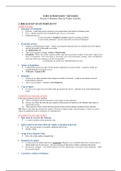Summary
Summary Breach of Statutory Duty & Product Liability revision
- Module
- Tort law
- Institution
- Cambridge University (CAM)
A Tort law revision summary on breach of statutory duty and product liability. Received a 2:1 mark from Cambridge University!
[Show more]



